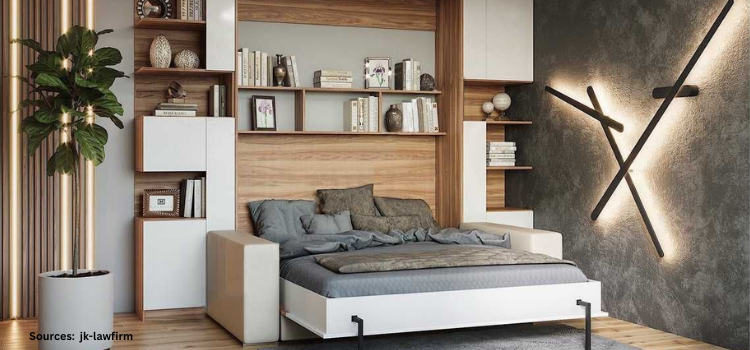From Imagination to Reality: The Latest Breakthroughs of Smart Furniture
17-Feb-2025

Introduction
In an age where technology and aesthetics harmonize to redefine our living spaces, the smart furniture industry emerges as the frontline of innovation. As the world becomes increasingly interconnected, so do the objects within it. From the modest chair to the multifunctional coffee table, the boundaries of traditional furniture are undergoing a profound transformation.
This article ventures into the dynamic realm of the smart furniture industry, where innovation knows no bounds. Beyond mere comfort and utility, contemporary furniture designs incorporate cutting-edge technologies, forging a symbiotic relationship between form and function. With sensors, AI integration, and sustainability at the core, these innovative creations not only enhance daily lives but also reflect evolving digital culture.Exploring the five latest trends and groundbreaking innovations, this article offers a glimpse into a future where furniture becomes an integral part of connected, intelligent, and artfully-designed homes.
1. Integration of IoT
The integration of Internet of Things (IoT) technology has emerged as a game-changing innovation in the smart furniture industry. It allows furniture to connect seamlessly with other smart devices and the broader digital ecosystem, ushering in a new era of convenience and control. For instance, a smart sofa equipped with IoT capabilities might adjust its recline based on the user's body posture or suggest an optimal seating position for comfort.
In bedrooms, smart mattresses can analyze sleep patterns and recommend adjustments for better rest. In addition, with the power of IoT, individuals can seamlessly control various aspects of the living space, such as adjusting lighting, temperature, and entertainment systems. All of this can be accomplished with just a smartphone or a simple voice command. This integration not only enhances user experience but also paves the way for more sustainable and energy-efficient living, making smart furniture an essential part of modern, interconnected homes.
Sleep Number Corporation, a leader in wellness technology, unveiled its next-generation Sleep Number smart beds and Lifestyle Furniture in April 2023. These beds utilize advanced sensors and artificial intelligence (AI) to study each person's unique body metrics and sleep habits. They can automatically change their settings to suit a person's evolving circumstances, whether they are pregnant, a recovery from an injury, aging, or a regular daily use. This development aligns with the broader shift towards creating intelligent and interconnected living spaces that cater to individual preferences and needs in the ever-evolving smart home industry.
2. Switch to Sustainability and Eco-friendly Products
The smart furniture industry is experiencing a compelling paradigm shift towards sustainability and eco-friendly materials, underscoring an evolving consumer preference for environmentally responsible choices. Manufacturers and designers have ardently embraced this trend, opting for materials that not only minimize ecological impact but also reduce carbon footprints, thereby fostering a more sustainable future.
Humanscale, a premier designer of ergonomic office furniture, exemplifies a significant example of this transformation. In March 2023, it introduced the Path sustainable task chair, which has been met with enthusiasm in the smart furniture landscape. This remarkable chair embodies its commitment to environmental stewardship, incorporating approximately 10 kilograms of recycled materials, including reclaimed fishing nets, waste plastic bottles, and post-industrial elements.
However, the appeal of the Path chair extends beyond its eco-conscious foundation. It seamlessly blends style and functionality with its intuitive features and limited manual controls. Using Form-Sensing Mesh Technology ensures that the chair instantly adjusts to and moves with each unique user, eliminating the need for extensive training, complex instructions, or laborious manual adjustments.
The result is a user-friendly, aesthetically pleasing, and eco-friendly addition to the smart furniture industry, illustrating that sustainability and style coexist harmoniously. This trend reflects an industry-wide dedication to offering consumers sustainable choices that not only reduce environmental impact but also elevate the appeal and usability of smart furniture, ultimately reshaping the landscape of modern interior design.
3. Augmented Reality (AR) in Shopping Experience
The integration of augmented reality (AR) in the shopping experience represents a compelling and innovative trend within the smart furniture industry. This latest development is set to redefine the way consumers interact with and purchase furniture, offering an immersive and interactive approach that blends the physical and digital realms seamlessly.
In July 2023, SES-imagotag, a global leader in digital solutions for physical commerce, showcased the potential of AR by entering an agreement with the world's largest furniture retailer. They deployed the VUSION IoT Cloud platform and smart electronic shelf labels, allowing shoppers to engage with products in an entirely new way. Customers can now use their smartphones or AR-enabled devices to visualize how furniture would fit within their living space.
This technology empowers shoppers to make more informed decisions, reducing the uncertainty of purchasing furniture online. The VUSION platform not only enhances the customer's in-store experience but also improves the efficiency of in-store fulfillment for online orders, streamlining the entire shopping process.
This trend underscores the industry's commitment to transforming traditional shopping into a dynamic, technology-driven experience. Retailers are recognizing the need to embrace digital transformation, making their physical stores high-value assets that seamlessly integrate with online offerings. This shift toward automation, data-driven insights, and real-time connectivity between suppliers and consumers not only elevates the shopping experience but also positions the smart furniture industry at the forefront of technological innovation. With AR integration, shopping for furniture becomes not just a transaction but an engaging and immersive journey.
4. Multifunctional Designs
Multifunctional designs have emerged as a groundbreaking innovation within the smart furniture industry, reshaping how we perceive and utilize living spaces. This latest trend combines ingenuity and aesthetics, offering furniture that seamlessly integrates mechanical marvels with sleek design, optimizing space and providing multiple functionalities through a single and adaptable piece.
For instance, in July 2023, Ebarza unveiled an exclusive collection of smart furniture pieces, indicating a new era in interior design. These futuristic furniture pieces have been precisely crafted to cater to the evolving needs of contemporary living. One particularly impressive addition is the Life collection, which includes innovative and adaptable solutions. These furniture pieces can seamlessly transform from a bed into a desk, a sofa, or a table, offering incredible versatility.
This flexibility empowers customers to make the most of their living spaces, enabling them to adapt rooms for various purposes. Whether transforming a home office into a guest bedroom or a live room into a play area for children, these multifunctional designs add an element of adaptability and practicality to modern living.
The multifunctional furniture trend embodies the industry's commitment to enhancing the functionality of living spaces without compromising on style. It not only maximizes the utility of every square foot but also elevates the overall aesthetics, aligning perfectly with the demands of contemporary living in an ever-evolving world.
5. Health and Wellness Features
In a significant innovation within the smart furniture industry, health and wellness have taken center stage, offering furniture solutions that prioritize well-being and comfort. This latest trend addresses the growing awareness of the essential connection between living spaces and health. A noteworthy example of this trend can be found in Flexsteel, a prominent manufacturer of recliners and lift chairs. In July 2023, it unveiled its innovative line of recliners called Zecliner.
Unlike conventional recliners, Zecliner is designed with a primary focus on providing a holistic sleep solution. It caters to various sleep-related issues, such as sleep apnea, pregnancy, post-surgery recovery, and rehabilitation. These recliners are designed to provide a diverse range of health benefits, aimed at improving sleep quality, so users wake up feeling revitalized and refreshed.
The innovative features of Zecliner distinguish it from the rest of the recliners. Certain models boast automatic ambient lighting and a Technogel pillow, providing both cooling comfort and alleviating issues such as back pain and discomfort. Furthermore, Zecliner's design caters to side sleepers, marking a notable advancement in the sleep recliner industry.
This trend underscores the growing commitment of the smart furniture industry to promote health and wellness in the daily lives. It is not just about furniture; it is about creating spaces that nurture well-being, ensuring that the users can rest, relax, and recover comfortably. The integration of health and wellness features in furniture exemplifies a holistic approach to improving the quality of life within a home.
Summing Up
The latest innovations in the smart furniture industry demonstrate remarkable advancements in the fusion of technology and everyday living. These innovations have redefined the very essence of furniture, ensuring not just aesthetic appeal but also practicality and responsiveness. From self-adjusting ergonomic chairs enhancing comfort to multi-purpose tables with integrated wireless charging capabilities, the industry consistently pushes the boundaries of furniture's capabilities. The incorporation of voice-activated assistants, IoT connectivity, and eco-friendly materials underscores the industry's dedication to improving daily life experiences and lessening the environmental impact. The future of smart furniture promises an exciting amalgamation of convenience, sustainability, and aesthetics, poised to reshape living spaces for years to come.
About the Author
 Sunanda Ghosh is a researcher with more than 3 years of experience. She has a passion for understanding consumer behavior and market trends, and uses her skills in innovative ways to gather and analyze data. Throughout her career, she has worked with a diverse range of global clients across various industries including technology, semiconductor, and energy. She is dedicated to providing valuable insights that can help shape a company's direction and drive success.
Sunanda Ghosh is a researcher with more than 3 years of experience. She has a passion for understanding consumer behavior and market trends, and uses her skills in innovative ways to gather and analyze data. Throughout her career, she has worked with a diverse range of global clients across various industries including technology, semiconductor, and energy. She is dedicated to providing valuable insights that can help shape a company's direction and drive success.
The author can be reached at sunanda.ghosh@nextmsc.com
Add Comment
Related Blogs
Leaders in Automation Kion, Honeywell, and ABB Influence on the Warehouse Market
Next Move Strategy Consulting forecasts that the Warehouse A...
Unveiling the Top 10 Innovators in the Global Robot Vacuum Cleaner Sector
Next Move Strategy Consulting states that the global robot v...
Shaping the Future: The Transformative Impact of Packaging Robots on Manufacturing Efficiency
Packaging robots include automated machines designed to hand...











